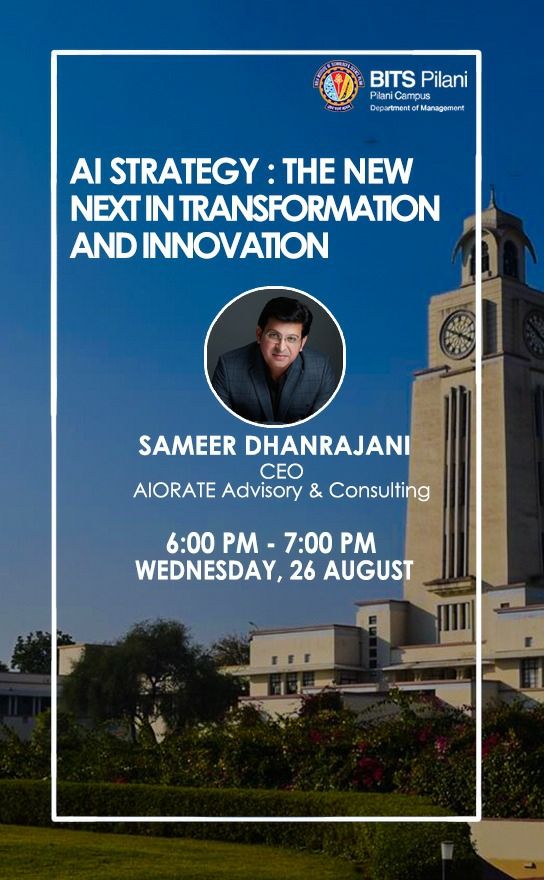
Webinar on AI Strategy at BITS Pilani
Add Your Heading Text Here

Continuing with the webinar series for the batch of 2021 & 2022 along with our noteworthy alumni, BITS Pilani called-in AIQRATE for a session is on ‘AI Strategy : The new next in Transformation and Innovation’ by Mr Sameer Dhanrajani , on 26th August 2020.
Related Posts
AIQRATIONS

Webinar on AI & Analytics – Chitkara Business School
Add Your Heading Text Here

Related Posts
AIQRATIONS

AIQRATE at IIM Visakhapatnam
Add Your Heading Text Here

ANK – The IT & Analytics Club at IIM Visakhapatnam hosted Pristine edition of the webinar series: The Leadership Talkies hosted by The Business Cluster of IIM Visakhapatnam
Webinar was on on AI & Analytics: Accelerating Business Decisions
The New Next in Strategy & Transformation by Sameer Dhanrajani, CEO & Co-founder, AIQRATE
Related Posts
AIQRATIONS
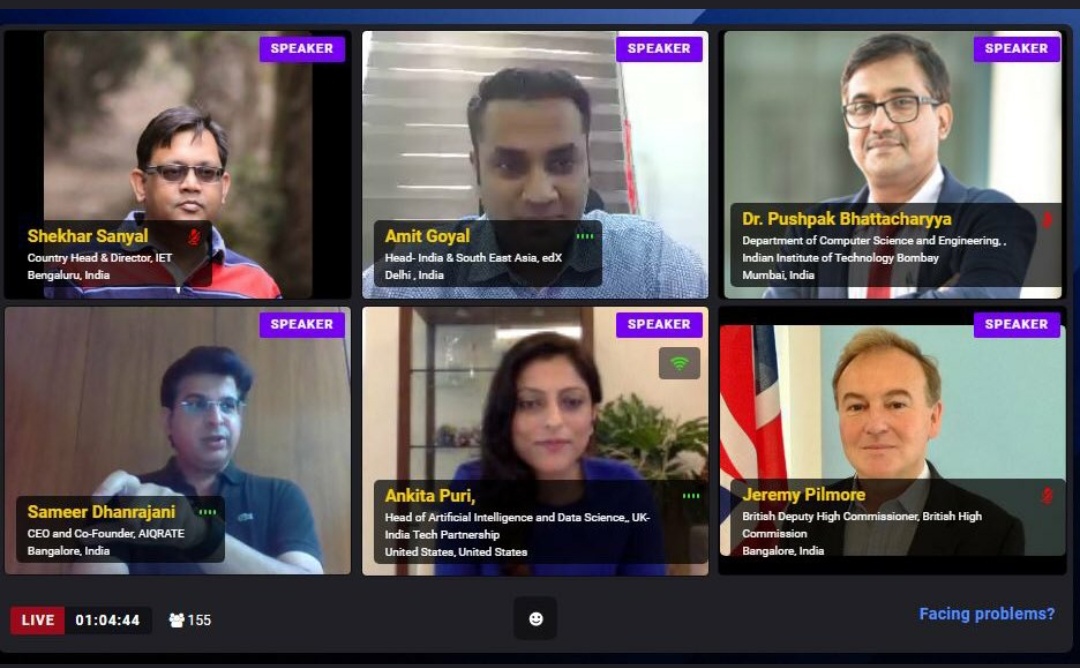
AIQRATE in Virtual Round-table organized by IET in partnership with British High Commission
Add Your Heading Text Here

Institute of Engineers & Technology (IET) India with the British High Commission’s UK India Tech Partnership to led a joint study on AI skilling landscape in India. The study uncovered key pressing challenges around AI skilling including curriculum, content, access, availability as well as perceived end results of gaining AI skills.
To understand the entire gamut of AI skilling space further, IET brought together global experts for a virtual round table on Friday, July 3rd 2020 to dive into the depths of ‘AI Skilling in India: Opportunities, challenges and road ahead’. The session was inaugurated by Jeremy Pilmore, British Deputy High Commissioner, British High Commission, Bangalore, India. Sameer Dhanrajani, CEO & Co-founder, AIQRATE was part of the virtual round table which discussed about bridging AI skills gap in India.
Related Posts
AIQRATIONS
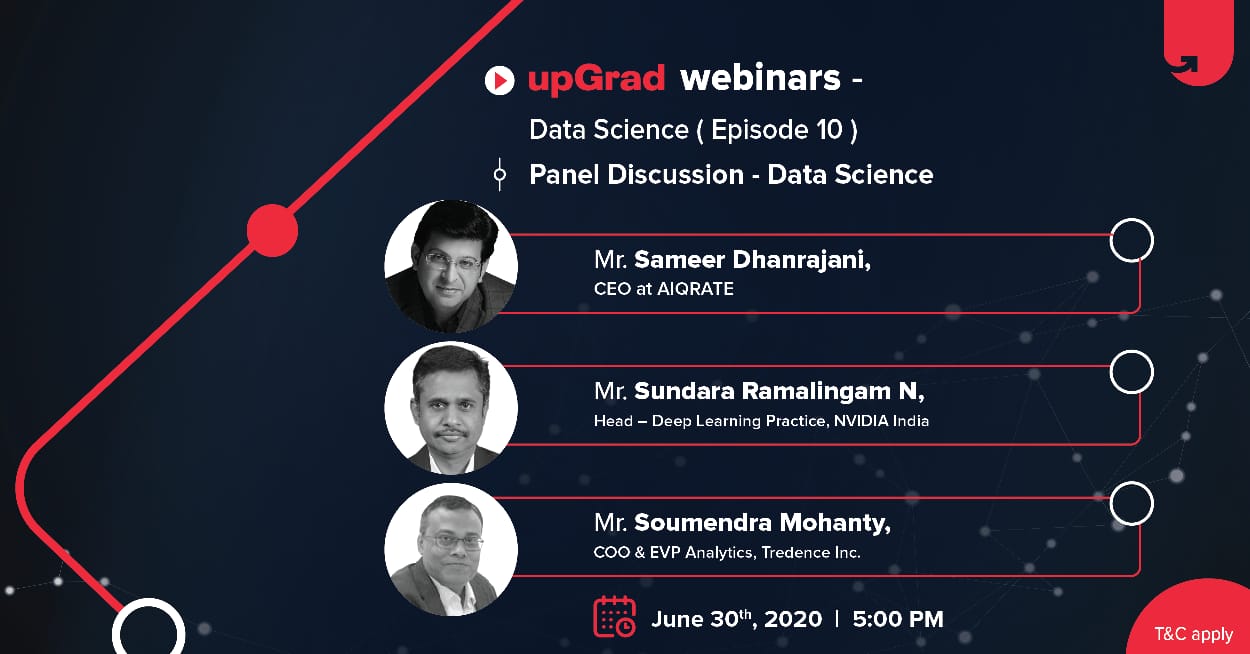
AIQRATE in upGrad’s Elite Panel Discussion on Data Science
Add Your Heading Text Here

Panel Discussion Topic: Evolution of Data Science & AI
Tuesday, June 30th 2020
Panel: Sameer Dhanrajani, CEO & Co-founder, AIQRATE Advisory & Consulting, Sundara Ramalingam N, Head – Deep Learning Practice, NVIDIA & Soumendra Mohanty, COO & EVP Analytics, Tredence Inc.
The last 3 months, upGrad has organized webinars on Industry relevant topics by some of the most sought after speakers in varied different formats.
This was the Elite Panel Discussion on Data Science to end the quarter on a high.
To shed some light on the Why(s) and How(s), the impact it creates on each career path and the ways in which young aspirants should function in the Data Science industry, upGrad brought together for this panel discussion 3 Industry experts who’ve closely seen data becoming the mastermind behind everything.
Related Posts
AIQRATIONS

Experiential Masterclass: AI Strategy for Enterprise Decision Making
Add Your Heading Text Here

The most awaited experiential masterclass on AI Strategy for Enterprise Decision Making was held on Saturday, June 13th 2020 with global participants.
This bespoke and experiential masterclass will be delivered by a seasoned AI evangelist and business builder. Sameer has a proven capability of scaling AI business practices & building AI CoE’s, has consulted with several global & Indian enterprises, GCC’s on AI strategy & transformation, executed 3000+ AI & Analytics consulting engagements. The Masterclass will compel the participants to cogitate towards developing AI strategies in conjunction with looking at developing frameworks and action plans for leveraging AI capabilities within their organizations and business functions for inculcating Transformation, Innovation and Disruption dynamics within their organizations. The participants will also be showcased with topical scenarios, best practices and global trends in AI arena.
Related Posts
AIQRATIONS
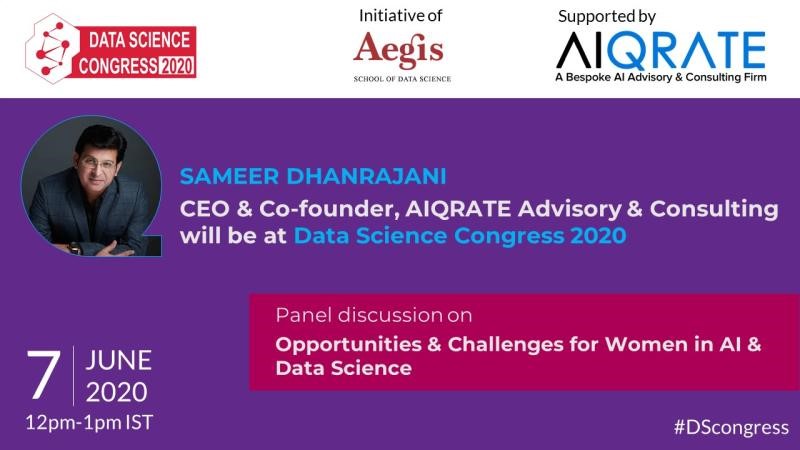
AIQRATE at Data Science Congress 2020 organized by Aegis School of Data Science & Cybersecurity
Add Your Heading Text Here

Live panel discussion on “Women in data and Responsible AI” was moderated by Sameer Dhanrajani, CEO, AIQRATE at Data Science Congress 2020 organized by Aegis School of Data Science and Cybersecurity.
Panel included: Dr. Rohini Srivathsa, CTO, Microsoft India, Dr. Geetha Manjunath, Founder CEO/CTO, Niramai; Dr. Tetiana Kodliuka, Chief Science Officer, Dathena; Mathangi Sri, Head of Data – GoFood, Gojek.
AIQRATE was the Support Partner of Data Science Congress 2020.
Related Posts
AIQRATIONS
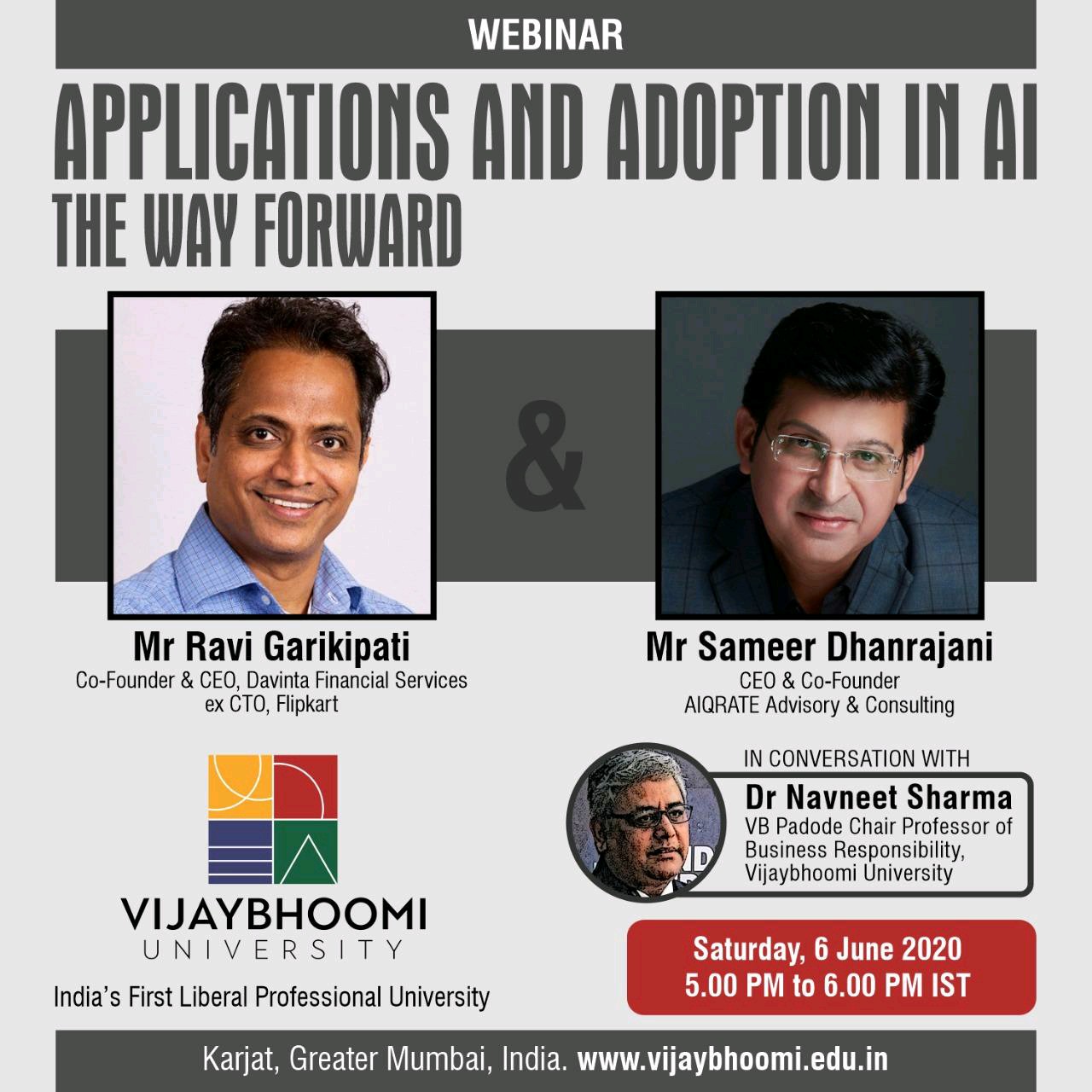
AIQRATE in Webinar hosted by Vijaybhoomi University
Add Your Heading Text Here

AI & Data Sciences has emerged as the biggest buzzword in the job market. This symbolises the way organizations are using data extensively to derive actionable insights into the future. A Forbes report suggests that LinkedIn is the fastest growing job today in Data Science and Machine Learning.
Webinar: APPLICATIONS AND ADOPTION IN AI: THE WAY FORWARD
Sameer Dhanrajani, CEO & Co-founder, AIQRATE Advisory & Consulting
Ravi Garikipati, Co-founder & CEO, Davinta Financial Services & ex CTO, Flipkart
in conversation with
Navneet Sharma, Dean, Vijaybhoomi University
on Saturday, June 6th 2020
Related Posts
AIQRATIONS

Business Decisions Transformation : AI meets Behavioral Sciences : New Strategic Approach
Add Your Heading Text Here

Ascendancy of artificial intelligence (AI) revolution has been made possible by the machine enabled , ensemble configured algorithm revolution. The machine learning algorithms researchers have been developing for decades, when cleverly applied to today’s web-scale data sets, can yield surprisingly good forms of intelligence. For instance, the United States Postal Service has long used neural network models to automatically read handwritten zip code digits. Today’s deep learning neural networks can be trained on millions of electronic photographs to identify faces, and similar algorithms may increasingly be used to navigate automobiles and identify tumors in X-rays.
But current AI technologies are a collection of big data-driven point solutions, and algorithms are reliable only to the extent that the data used to train them is complete and appropriate. One-off or unforeseen events that humans can navigate using common sense can lead algorithms to yield nonsensical outputs.
Design thinking is defined as human-centric design that builds upon the deep understanding of our users (e.g., their tendencies, propensities, inclinations, behaviors) to generate ideas, build prototypes, share what you’ve made, embrace the art of failure (i.e., fail fast but learn faster) and eventually put your innovative solution out into the world. And fortunately for us humans (who really excel at human-centric things), there is a tight correlation between the design thinking and artificial intelligence.
Artificial intelligence technologies could reshape economies and societies, but more powerful algorithms do not automatically yield improved business or societal outcomes. Human-centered design thinking can help organizations get the most out of cognitive technologies.
Divergence from More Powerful Intelligence To More Creative Intelligence
Whilst algorithms can automate many routine tasks, the narrow nature of data-driven AI implies that many other tasks will require human involvement. In such cases, algorithms should be viewed as cognitive tools capable of augmenting human capabilities and integrated into systems designed to go with the grain of human—and organizational—psychology. We don’t want to ascribe to AI algorithms more intelligence than is really there. They may be smarter than humans at certain tasks, but more generally we need to make sure algorithms are designed to help us, not do an end run around our common sense.
Design Thinking at Enterprise Premise
Although cognitive design thinking is in its early stages in many enterprises, the implications are evident. Eschewing versus embracing design thinking can mean the difference between failure and success. For example, a legacy company that believes photography hinges on printing photographs could falter compared to an internet startup that realizes many customers would prefer to share images online without making prints, and embraces technology that learns faces and automatically generates albums to enhance their experience.
To make design thinking meaningful for consumers, companies can benefit from carefully selecting use cases and the information they feed into AI technologies. In determining which available data is likely to generate desired results, enterprises can start by focusing on their individual problems and business cases, create cognitive centers of excellence, adopt common platforms to digest and analyze data, enforce strong data governance practices, and crowd source ideas from employees and customers alike.
In assessing what constitutes proper algorithmic design, organizations may confront ethical quandaries that expose them to potential risk. Unintended algorithmic bias can lead to exclusionary and even discriminatory practices. For example, facial recognition software trained on insufficiently diverse data sets may be largely incapable of recognizing individuals with different skin tones. This could cause problems in predictive policing, and even lead to misidentification of crime suspects. If the training data sets aren’t really that diverse, any face that deviates too much from the established norm will be harder to detect. Accordingly, across many fields, we can start thinking about how we create more inclusive code and employ inclusive coding practices.
CXO Strategy for Cognitive Design Thinking & Behavioral Science
CIOs can introduce cognitive design thinking to their organizations by first determining how it can address problems that conventional technologies alone cannot solve. The technology works with the right use cases, data, and people, but demonstrating value is not always simple. However, once CIOs have proof points that show the value of cognitive design thinking, they can scale them up over time.
CIOs benefit from working with business stakeholders to identify sources of value. It is also important to involve end users in the design and conception of algorithms used to automate or augment cognitive tasks. Make sure people understand the premise of the model so they can pragmatically balance algorithm results with other information.
Enterprise Behavioral Science – From Insights to Influencing Business Decisions
Every January, how many people do you know say that they want to resolve to save more, spend less, eat better, or exercise more? These admirable goals are often proclaimed with the best of intentions, but are rarely achieved. If people were purely logical, we would all be the healthiest versions of ourselves.
However, the truth is that humans are not 100% rational; we are emotional creatures that are not always predictable. Behavioral economics evolved from this recognition of human irrationality. Behavioral economics is a method of economic analysis that applies psychological insights into human behavior to explain economic decision-making.
Decision making is one of the central activities of business – hundreds of billions of decisions are made every day. Decision making sits at the heart of innovation, growth, and profitability, and is foundational to competitiveness. Despite this degree of importance, decision making is poorly understood, and badly supported by tools. A study by Bain & Company found that decision effectiveness is 95% correlated with companies’ financial performance.
Enterprise Behavioral Science is not only about understanding potential outcomes, but to completely change outcomes, and more specifically, change the way in which people behave. Behavioral Science tells us that to make a fundamental change in behavior that will affect the long-term outcome of a process, we must insert an inflection point.
As an example, you are a sales rep and two years ago your revenue was $1 million. Last year it was $1.1 million, and this year you expect $1.2 million in sales. The trend is clear, and your growth has been linear and predictable. However, there is a change in company leadership and your management has increased your quota to $2 million for next year. What is going to motivate you to almost double your revenues? The difference between expectations ($2 million) and reality ($1.2 million) is often referred to as the “behavioral gap” . When the behavioral gap is significant, an inflection point is needed to close that gap. The right incentive can initiate an inflection point and influence a change in behavior. Perhaps that incentive is an added bonus, President’s Club eligibility, a promotion, etc.
Cognitive Design Thinking – The New Indispensable Reskilling Avenue
Artificial intelligence, machine learning, analytics and mobile and cloud engineering will be the top technology areas where the need for re-skilling will be the highest.whilst there is a high probability that machine learning and artificial intelligence will play an important role in whatever job you hold in the future, there is one way to “future-proof” your career…embrace the power of design thinking & behavioral science.
In fact, integrating design thinking , behavioral science and artificial intelligence can give you “immense synergies ” that future-proof whatever career you decide to pursue. To meld these three disciplines together, one must:
Understand where and how artificial intelligence and behavioral science can impact your business initiatives. While you won’t need to write machine learning algorithms, business leaders do need to learn how to “Think like a data scientist” in order understand how AI can optimize key operational processes, reduce security and regulatory risks, uncover new monetization opportunities.
Understand how design thinking techniques, concepts and tools can create a more compelling and emphatic user experience with a “delightful” user engagement through superior insights into your customers’ usage objectives, operating environment and impediments to success.
Design thinking & Behavioral Science is a mindset. IT firms are trying to move up the curve. Higher-end services that companies can charge more is to provide value and for that you need to know that end-customers’ needs. For example, to provide value services to banking customers is to find out what the bank’s customer needs are in that country the banking client is based. Latent needs come from a design thinking philosophy where you observe customer data, patterns and provide a solution that the customer does not know. Therefore, Companies will hire design thinkers as they can predict what the consumer does not know and hence charge for the product/service from their clients. Idea in design thinking is to provide agile product creation or solutions.
Without Design Thinking & Behavioral Science, AI Will be Only an Incremental Value
Though organizations understand the opportunity that big data presents, many struggles to find a way to unlock its value and use it in tandem with design thinking – making “AI an colossal waste of time & money.” Only by combining quantitative insights gathered using AI, machine/deep learning, and qualitative research through behavioral science, and finally design thinking to uncover hidden patterns and leveraging it to understand what the customer would want, will we be able to paint a complete picture of the problem at hand, and help drive towards a solution that would create value for all stakeholders.
(AIQRATE, A bespoke global AI advisory and consulting firm. A first in its genre, AIQRATE provides strategic AI advisory services and consulting offerings across multiple business segments to enable clients navigate their AI powered transformation, innovation & revival journey and accentuate their decision making and business performance.
AIQRATE works closely with Boards, CXOs and Senior leaders advising them on their Analytics to AI journey construct with the art of possible roadmap blended with a jump start to AI driven transformation with AI@scale centric strategy followed by consulting them on embedding AI as core to business strategy within business functions and augmenting the decision-making capabilities with AI. Our bespoke AI advisory services focuses on curating & designing building blocks of AI strategy, embed AI@scale interventions and create AI powered organizations.
AIQRATE’s path breaking 50+ AI consulting frameworks, methodologies, primers, toolkits and playbooks crafted by seasoned and proven AI strategy advisors enable Indian & global enterprises, GCCs, Startups, SMBs, VC/PE firms, and Academic Institutions enhance business performance & ROI and accelerate decision making capability.
Visit www.aiqrate.ai to experience our AI advisory services & consulting offerings. Write to us :consult@aiqrate.ai . Follow us on Linkedin | Facebook | Twitter | Instagram )
Related Posts
AIQRATIONS
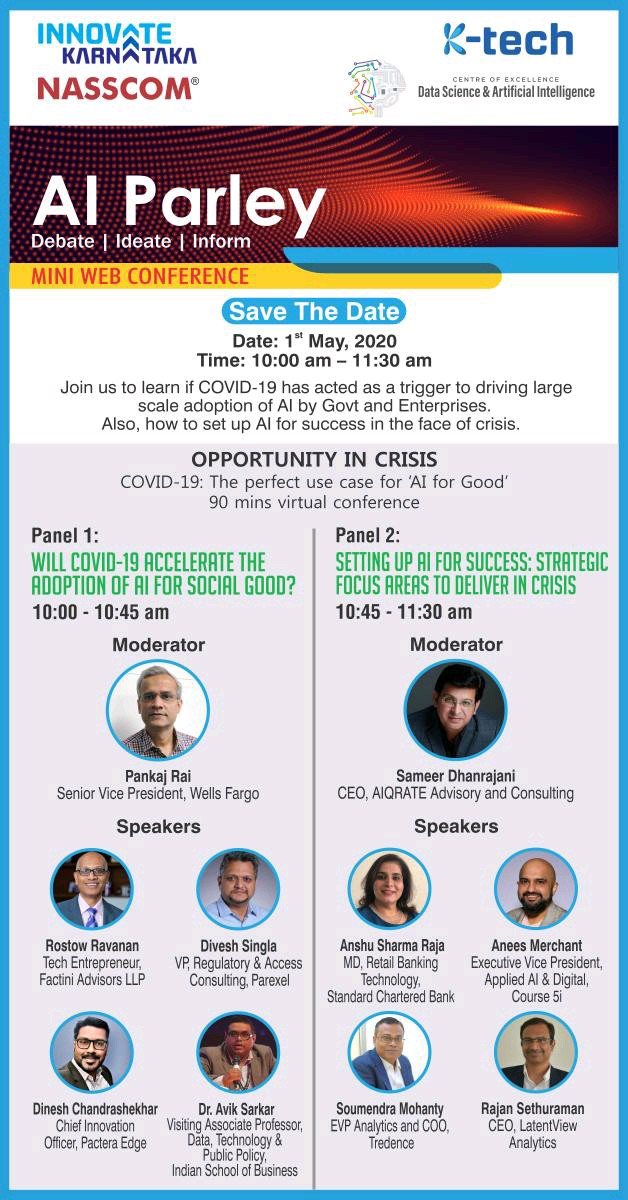
AIQRATE at NASSCOM’s The AI Parley Virtual Conference
Add Your Heading Text Here

NASSCOM CoE for DSAI conducted AI Parley to explore the opportunities COVID-19 has created in the AI space. Panel discussions were held to learn if COVID-19 has acted as a trigger to drive large scale adoption of AI by Govt and Enterprises. Sameer Dhanrajani, CEO & Co-founder, AIQRATE, moderated the Panel of eclectic guests from industry and academia to lend their views on Setting up AI for Success: Strategic focus areas to deliver in crisis.

